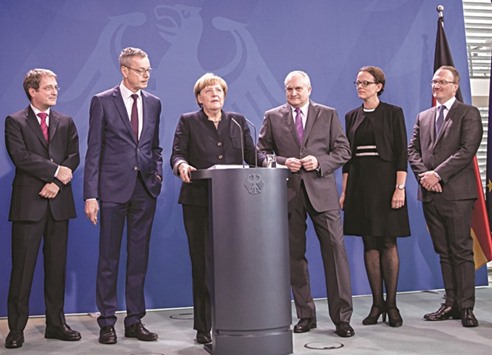The European Central Bank’s easy-money policy has let eurozone governments delay key reforms, a German expert panel said yesterday, urging the Frankfurt institution to ease off the massive stimulus spending.
“The extent of monetary easing in the euro area is no longer appropriate given the region’s economic recovery,” the German Council of Economic Experts said in its annual report to Chancellor Angela Merkel.
“The ECB should slow down its bond purchases and end them earlier.”
Under President Mario Draghi, the ECB has bought well over one trillion euros of government and corporate bonds in a bid to pump cash into the financial system.
Most analysts expect the central bank to extend the programme at its current €80bn ($88.6bn) per month rate past the current March 2017 cutoff, as growth in the euro area remains tentative.
But the five “wise men” – who in fact number one woman among them – warned that the ECB has reduced pressure on governments to reform.
“Even the German government did not sufficiently use the positive economic growth of the past few years for market-oriented reforms,” council chairman Christoph Schmidt said in a statement.
The experts predicted economic growth for the eurozone of 1.6% in 2016 and 1.4% in 2017.
Beyond the ECB, the experts warned that Britain’s vote to quit the EU in June shows reform is needed in the 28-member bloc.
“There is cause for concern given the strengthening trend of EU-critical voices in some member states,” they wrote.
Anti-EU sentiment was likely to increase without reform to give voters the feeling that their governments are in control, fixing the union’s finances and addressing transnational challenges like climate change, migration and terrorism, they warned.
But they also defended key pillars of the European project including the “four fundamental freedoms” on the movement of goods, capital, people and services.
The experts also backed the hotly-contested CETA free trade deal with Canada signed by EU leaders last week, and recommended pressing ahead with a yet more controversial planned US free trade agreement known as TTIP.
At home in Germany, the experts predicted growth would slow to 1.3% in 2017 after reaching 1.9% in 2016, “primarily due to calendar effects”.
They warned the government against increasing spending, advising instead that Berlin continue to pay down its debts, link the statutory retirement age to life expectancy, and make the labour market more flexible.
The last suggestion would also help to integrate the 900,000 refugees and migrants who arrived in Germany in 2015, the experts noted.
German joblessness falls to record low as economy ploughs on
Bloomberg/Frankfurt
German unemployment fell more than economists forecast in October, pushing the jobless rate to a fresh record low.
The number of people out of work declined by a seasonally adjusted 13,000 to 2.662mn in October, data from the Federal Labour Agency in Nuremberg showed yesterday. Economists in a Bloomberg survey forecast a drop of 1,000. The jobless rate dropped to 6%, the lowest level since the country’s reunification.
Measures of manufacturing and business confidence suggest Europe’s largest economy is poised to pick up toward the end of the year, after uncertainty over the UK’s vote to leave the European Union and weakening global demand caused a temporary slowdown in the third quarter. The Bundesbank said in October that underlying momentum is “still quite strong.”
“That number tends to be very volatile, but the trend is important,” said Jens Kramer, an economist at Nord in Hanover. “It shows that unemployment is steadily decreasing while employment is growing, which is a very favourable development for domestic demand and the German economic cycle.”
Economists surveyed by Bloomberg predict the German economy expanded 0.3% in the third quarter, after 0.4% in the previous three months. Gross domestic product data are due on November 15.
Germany’s central bank has pointed to export and business expectations in manufacturing as signs that the situation could improve in the coming month. Manufacturing grew at the fastest pace in almost three years in October, according to final data published by IHS Markit yesterday, as companies boosted hiring, partially in response to stronger foreign demand from the US and Asia.
“The labour market developed well in October,” Frank-Juergen Weise, president of the labour agency, said in a statement. “Unemployment fell markedly during the autumn revival, employment increased again and demand for new workers continued to rise.”
The number of people out of work fell by some 6,000 in western Germany and decreased by about 8,000 in the eastern part of the country, the labour agency said. At the same time, underemployment rose by a seasonally adjusted 11,000 nationwide due to a loosening of labour policies to target refugees, according to the report.

German Chancellor Angela Merkel (3rd left) addresses a press conference at the Chancellery in Berlin yesterday as she is handed over the annual report on the country’s economic development by members of the German Council of Economic Experts (from left) Volker Wieland, Peter Bofinger, (Merkel), Christoph M Schmidt (the council’s chairman), Isabel Schnabel and Lars P Feld. The experts also known as the five u201cwise menu201d predicted economic growth for the eurozone of 1.6% in 2016 and 1.4% in 2017.
